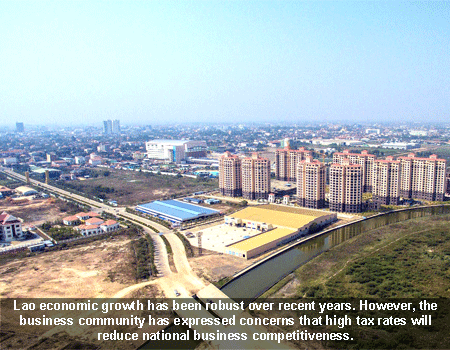Lao firms identify high tax rates as investment constraint
Lao enterprises have highlighted the perceived unprofessional practices of firms in the informal sector and high tax rates as the top constraints in investing in the country, according to a report from the World Bank.
The bank released its 2018 Lao enterprise survey recently, noting that about 40 percent of the surveyed enterprises named the unethical practices of the informal sector as a significant concern and obstacle to investing and doing business in the country.
The second concern is high tax rates with 33 percent of respondents identifying this issue as a barrier, according to the bank’s survey, titled Doing Business in Lao PDR-Constraints to Productivity.
According to the survey, which was financed by the World Bank, 23 percent of Lao firms identified transportation, electricity supply and the skills of workers as their concerns. 18 percent of enterprises said they were worried about access to land for investment, 18 percent believed trade regulations should be improved while 6 percent identified access to finance as a business barrier.
One of the most interesting points was that only 2 percent of the surveyed firms highlighted corruption in the country as a problem for business. Some might argue this implies that widespread and growing corruption in the country is still acceptable among the business community.
The World Bank hopes the release of the survey findings will be used by relevant Lao sectors as a reference to improve the country’s business climate. Earlier this month, Prime Minister Thongloun Sisoulith acknowledged the World Bank’s ease of doing business index report.
He issued administrative orders to economic ministries to do whatever they could to improve the business climate in the country in accordance with the bank’s guideline. He describes this move as an essential foundation for national economic sustainability.
The local business community has noted that business taxes and administrative fees imposed by the Lao government are higher than in neighbouring countries. Vietnam charges a corporate tax rate of only 22 percent while Thailand’s rate is lower still at 20 percent.
At present, the government charges enterprises a 24 percent tax on profits and 10 percent Value Added Tax on sales. In addition, the government also charges excise taxes at different rates depending on the type of goods. Early this month, the government imposed additional excise taxes on fuel leading to increased retail pump prices and adding to the cost of living in the country.
The Lao economy has witnessed remarkable recent growth that has averaged around 7 percent a year. However, this growth is based on the natural resource sector. The government has been urged to improve the business climate and to diversify its revenue collection base to secure national income sustainability.
Source: http://www.vientianetimes.org.la/FreeContent/FreeConten_Laofirms.php


 Thailand
Thailand




